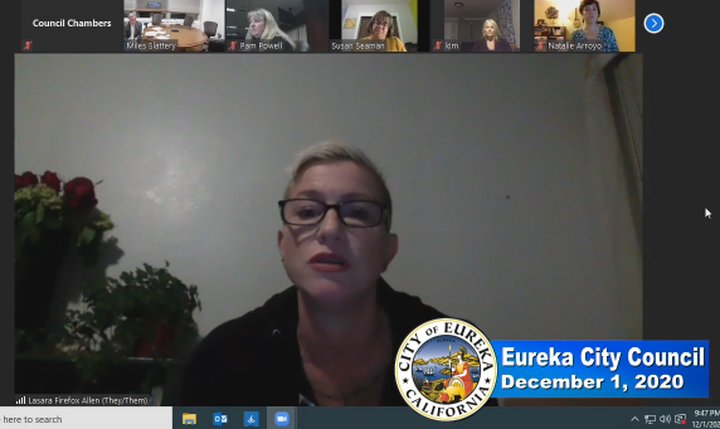
HACHR Executive Director Lasara Firefox Allen | Screenshot from the Eureka City Council meeting held via Zoom
###
During a nearly five-and-a-half-hour meeting on Tuesday night, the Eureka City Council rejected a proposed settlement agreement between the city and the Humboldt Area Center for Harm Reduction (HACHR) that would require HACHR to transition to a mobile-only syringe exchange program.
The vote was 3-2, with Councilmembers Leslie Castellano and Natalie Arroyo voting to approve the agreement and Coucilmembers Austin Allison, Heid Messner and Kim Bergel dissenting. The council then agreed to hold a continued meeting tonight to allow for reconsideration of the vote.
The agreement proposal came out of a formal mediation session attended by representatives from the City, HACHR and Open Door Health Services. By accepting the proposal, HACHR would agree not only to move its syringe exchange to a mobile program, but also to install a fence around its Third Street center and hire a monitor to regulate activity in and around the facility.
HACHR Executive Director Lasara Firefox Allen told the council that the agreement would require HACHR to transition to a mobile exchange by June 1, 2021, giving the non-profit and the city time to obtain a vehicle for the mobile delivery. HACHR agreed to hire a monitor immediately to help regulate the center’s rules and regulations. It would probably take some time to install the fence, Allen said, which Open Door agreed to pay for, pending approval of the agreement.
The Third Street center would still offer the other harm reduction services, such as overdose education and prevention, clothing distribution and free HIV and Hepatitis C testing, Allen said.
The City and HACHR’s relationship has long been fraught, with many council and community members expressing concerns over the syringe exchange program and some residents complaining about the activity at the Third Street site. Tensions recently culminated in a months-long undercover investigation of the Third Street Facility by the Eureka Police Department, during which the EPD allegedly observed HACHR staff knowingly allowing drug sales and use on the site.
Though HACHR denied the allegations, the Eureka City Council sent a letter to the state, formally opposing the state’s reauthorization of HACHR’s syringe exchange program. The California Department of Public Health did reauthorize the program, but excluded the city of Eureka, giving the city more regulatory control.
But for some council members, the agreement proposal didn’t seem like it would hold HACHR accountable for its actions. Councilmember Bergel expressed concern about what would happen over the next six months before HACHR transitions to a mobile exchange.
“Good faith is not going to work for the community,” Bergel said.
Councilmember Castellano moved to approve the settlement agreement proposal, which was voted down. After that there was a bit of confusion about what would happen next.
There was some discussion of temporarily prohibiting HACHR from offering the syringe exchange over the next six months. But City Manager Miles Slattery explained that this would require amending the city’s syringe exchange program ordinance and would be a complicated process.
Ultimately, the council voted unanimously to reconsider the vote at an extended meeting, which will be held tonight at 7:30 p.m.
You can view the agenda and directions on how to participate here.
Allen said that none of the proposed changes can occur until an agreement is reached, adding that they are willing to do what it takes to make that happen.
“Gaining trust is a two way street, as has been said here on a number of occasions,” Allen said earlier in the meeting. “We’re doing our best to walk hand in hand with the city council, with Miles, with the city of eureka to address concerns that are being brought.”
###
In other business, the council voted 4-1, with councilmember Leslie Castellano dissenting, to adopt an ordinance that prohibits camping in city parks, near city trails and in some commercial districts within the city.
The ordinance replaces the city’s existing camping ordinance, which was rendered moot by a court ruling in the 2019 Martin v. City of Boise case, in which the Ninth Circuit Court of Appeals overturned Boise’s camping ordinance on the grounds that it criminalized homelessness.
The new ordinance allows for “involuntary camping” — meaning camping when no other shelter is available to the person — in most parts of the city during nighttime hours, specifically precluding the “the period from fifteen minutes after sunrise to fifteen minutes before sunset.”
Camping is not allowed any time day or night in city parks, within 75 feet of city trails or anywhere in the Downtown/ Old Town Business District, the Waterfront Business District, the North Gateway District or Henderson Center.
Councilmember Castellano said that she felt that it was not the right time to pass this ordinance, during the COVID-19 pandemic, when the CDC has advised against clearing encampments. “I would advise waiting on this until we have measures in place that can address the health risk,” Castellano said.
But other councilmembers felt that this ordinance was necessary as a tool to help guide unhoused people to shelters. The penalty for breaking the ordinance would be an infraction and punishable by a fine. But Eureka Police Chief Steve Watson City Attorney Bob Black assured council that the ordinance is meant to only be used as a last resort, only to be enforced by a police officer after they have exhausted all other possibilities.
Councilmember Arroyo said that it did not “feel good” to vote for this ordinance, but that she felt it was necessary to deter public camping in some areas where it is not appropriate, especially immediately near businesses.
“This is something that can be appropriately used as needed in districts where [camping] is wearing people out and it’s wearing people’s good nature out,” Arroyo said. “And I even am feeling that.”
###
PREVIOUSLY:
CLICK TO MANAGE